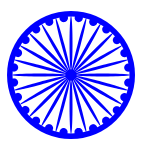Comprehensive Guide to the JEE Mains 2025 Syllabus
The Joint Entrance Examination (JEE) JEE Mains 2025 is a crucial milestone for aspiring engineers, architects, and planners across India. The exam tests the understanding of Mathematics, Physics, and Chemistry in addition to aptitude tests for specialized streams like B.Arch. and B.Planning. This blog provides an overview of the comprehensive syllabus, helping you strategize and streamline your preparation.
Mathematics Syllabus
Core Topics:
Sets, Relations and Functions: Explore union, intersection, and complements of sets, their algebraic properties, and topics on equivalence relations and composition functions.
Calculus: Core concepts include limits, continuity, differentiability, integration methods, and applications for examples such as maxima/minima and area computation
Linear Algebra: Some concepts are matrices, determinants and their applications in solving equations or geometric problems.
Coordinate Geometry: Involves the equation of lines, circles, and conics and is a part of this syllabus due to spatial visualization and practical uses.
Probability and Statistics: Ranges from measures of dispersion to Bayes’ theorem, hence requiring analytical precision.
Physics Syllabus
Main Topics
Mechanics: These include topics like Newton’s Laws of motion, work-energy theorem, and rotational motion.
Electrodynamics: Covers topics ranging from electrostatics, current electricity, to magnetism. It has plenty of theoretical and practical applications.
Modern Physics: Quantum concepts, photoelectric effects, and atomic models form the core of this section.
Waves and Thermodynamics: Includes the study of oscillations, heat transfer methods, and kinetic theory.
Practical Skills: Familiarity with experimental techniques is emphasized, such as using Vernier calipers, screw gauges, and conducting thermodynamics-related experiments.

Chemistry Syllabus
Physical Chemistry:
Atomic Structure: Understand quantum mechanics, the Bohr model, and orbital theories.
Thermodynamics: Explore laws governing energy changes and spontaneity in reactions.
Chemical Kinetics: Understand reaction rates, orders, and mechanisms.
Inorganic Chemistry:
Periodic Table Trends: Understand properties such as ionization energy and electron affinity.
Coordination Chemistry: Understand bonding theories and importance of complex compounds.
Organic Chemistry:
Hydrocarbons and Functional Groups: Understand reactions and properties of organic compounds such as alcohols, aldehydes, and amines.
Biomolecules: Understand carbohydrates, proteins, and nucleic acids for interdisciplinary insights.
Specialized Paper Syllabus
B.Arch. and B.Planning
Aptitude Test: Tests spatial visualization, architectural awareness, and critical reasoning.
Drawing Test: Draw urban or rural landscape, architectural elements, abstract compositions.
For B. Planning aspirants, social sciences, urbanization, and developmental issues are given extra focus.
Strategic Preparation Tips
Understand the Weightage: Prioritize topics based on historical weightage in exams.
Practice Problems: Mathematics and Physics require rigorous problem practice.
Build Conceptual Clarity: Chemistry, particularly organic and inorganic portions, requires clear understanding of reaction mechanisms and periodic trends.
Mock Tests and Time Management: Past papers and mock tests under timed conditions need to be practiced regularly.
Practical Knowledge: Laboratory experiments need to be performed for the better understanding of theoretical concepts.
Conclusion
JEE Main 2025 is not just an exam; it leads the way to premier institutes such as IITs, NITs, and IIITs. Well planned study and consistent practice and conceptual clarity would help achieve the desired level of competency. Plan in advance and consistently utilize all the material so that dreams are actually materialized.
Visit official NTA website here.
DOWNLOAD CONFIRMATION PAGE FOR JEE MAINS 2025 SESSION 1
Visit homepage
About the National Testing Agency (NTA)
The National Testing Agency (NTA) is an independent, autonomous, and self-sustained premier testing organization established by the Ministry of Education, Government of India, in 2017. Its primary objective is to enhance equity and quality in education by developing and administering standardized tests across the country. NTA has revolutionized the examination process with its focus on transparency, reliability, and efficiency, ensuring a fair assessment of candidates’ skills and knowledge.
Exams Conducted by NTA
The National Testing Agency (NTA) administers several national-level entrance and eligibility examinations across diverse fields of education. These exams play a pivotal role in determining admissions and eligibility for higher education and professional programs in India. Below is a list of key exams conducted by NTA:
Undergraduate Entrance Exams
-
JEE Main
- For admission to undergraduate engineering and architecture programs in institutions like NITs, IIITs, and other Centrally Funded Technical Institutions (CFTIs).
- Serves as a qualifying exam for JEE Advanced for admission to IITs.
-
NEET (UG)
- The National Eligibility cum Entrance Test for undergraduate medical, dental, and AYUSH courses in India.
- NEET is the single entrance test for medical admissions across the country.
-
CUET (UG)
- Common University Entrance Test for undergraduate admissions in central universities and other participating institutions.
Postgraduate Entrance Exams
-
CUET (PG)
- For admission to postgraduate programs in central universities and other participating institutions.
-
GPAT (Graduate Pharmacy Aptitude Test)
- For admission to M.Pharm programs and eligibility for scholarships and financial assistance.
-
CMAT (Common Management Admission Test)
- For admission to MBA/PGDM programs in AICTE-approved management institutions.
National-Level Eligibility Tests
-
UGC-NET
- University Grants Commission National Eligibility Test for determining eligibility for Assistant Professor roles and awarding Junior Research Fellowships (JRF) in Indian universities and colleges.
-
CSIR-UGC NET
- Conducted for eligibility in lectureship and awarding JRF in science-related subjects.
Specialized and Institutional Exams
-
ICAR AIEEA
- Indian Council of Agricultural Research All India Entrance Examination for Agriculture, conducted for undergraduate and postgraduate admissions in agricultural universities.
-
AIAPGET
- All India AYUSH Post Graduate Entrance Test for postgraduate admissions in AYUSH courses (Ayurveda, Yoga, Naturopathy, Unani, Siddha, and Homeopathy).
-
IGNOU Ph.D. and OPENMAT
- Entrance exams for admission to IGNOU’s doctoral programs and management courses.
Other Notable Exams
-
Delhi University Entrance Test (DUET)
- For postgraduate, M.Phil, and Ph.D. admissions in the University of Delhi.
-
IIFT MBA Entrance Exam
- For admission to the Indian Institute of Foreign Trade’s MBA (International Business) program.
-
NCHM JEE
- National Council for Hotel Management Joint Entrance Examination for admission to hospitality and hotel administration programs.
-
SHRESHTA (NETS)
- Scheme for Residential Education for Students in High Schools in Targeted Areas, aimed at talented SC students.
check SSC syllabus.

